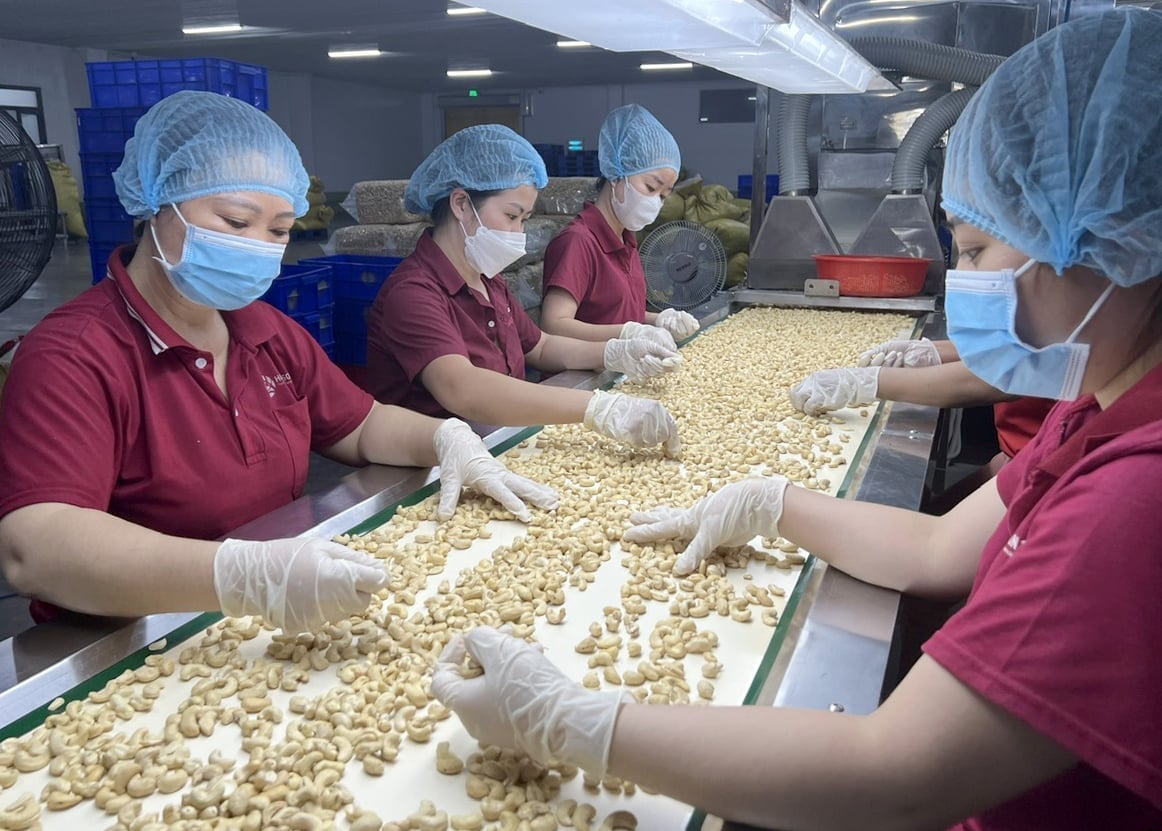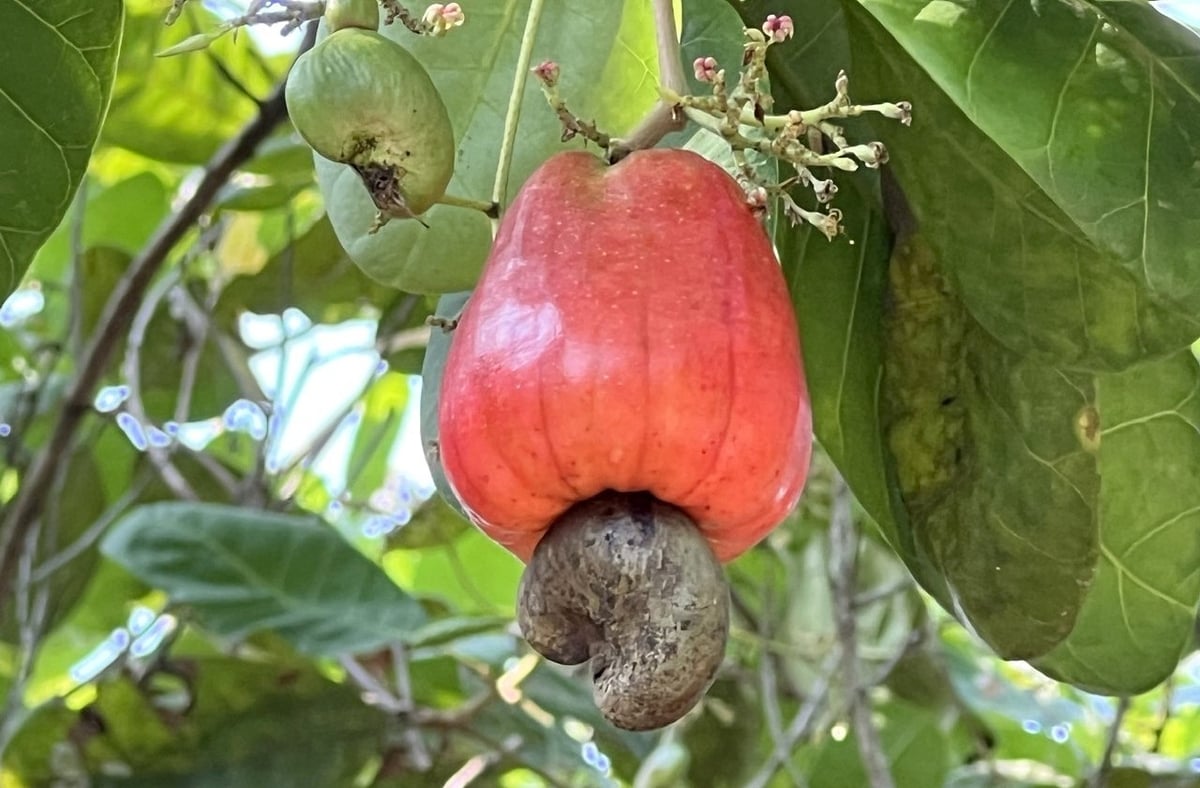(VAN) The U.S. is the largest market for Vietnamese cashew nuts. However, when exports to the U.S. encounter difficulties due to reciprocal tariffs, Vietnamese cashews still have many other potential markets.

Employees of Hoang Son 1 Joint Stock Company’s cashew processing facility. Photo: Son Trang.
The impact of tariff policies is causing a decline in Vietnam’s cashew exports to the United States. In April 2025, cashew exports to the United States totaled nearly 14,000 tonnes, with a value of 92 million USD. This represents a 25% decrease in volume and a 4.2% drop in value since April 2024. Compared to the same period in 2024, Vietnam exported 42,000 tonnes of cashews to the United States, which is equivalent to 289 million USD, cumulatively for the first four months of 2025. This represents a 26% decrease in volume and a 4.8% decrease in value.
The 10% import tariff imposed by the United States on commodities from all markets is the reason for the decline in cashew exports to the United States, according to Mr. Vu Thai Son, Chairman of the Binh Phuoc Cashew Association and General Director of Long Son Joint Stock Company.
Global cashew prices are currently 25–30% higher than they were in 2024. The price of cashews in the U.S. market has increased by 35–40% as a result of the 10% import tariff. Therefore, numerous consumers in the United States have either decreased their cashew consumption or shifted to alternative nut varieties, including almonds and walnuts.
Although cashew exports to the United States have experienced a substantial decline, they have experienced a significant increase in China. In April, China emerged as the primary export market for Vietnamese cashews, with a volume of nearly 24,000 tonnes and a value of 149 million USD. This represents a 127% increase in volume and a 130% increase in value, as compared to March 2025, and a 74% rise in volume and a 113% rise in value compared to April 2024.
Cashew exports to China totaled 41,000 tonnes, valued at 259 million USD, during the first four months of 2025. This represents an 11.2% increase in volume and a 29.1% increase in value when compared to the same period in 2024. This implies that the volume and value of exports to China were nearly equivalent to those to the United States during the initial four months.
The increasing demand for cashews in China has resulted in Chinese traders purchasing substantial quantities of Vietnamese cashews in recent months, as per Mr. Vu Thai Son. It is important to note that the price of cashews exported to China is higher than their pricing in the U.S. market due to the fact that Chinese customers have higher quality standards.
According to certain international market analysis firms, the population expansion in China has substantially augmented the demand for nuts, such as cashews. The demand for snacks is high in China, particularly among the younger generation, who spend a significant portion of their day commuting or working. Despite the fact that the Chinese market offers a wide variety of snacks, the demand for cashews and associated products is increasing at a rapid pace due to their reputation as healthy, nutritious snacks.

Cashew plantation in Binh Phuoc. Photo: Son Trang.
Cashew exports to numerous other markets are also expanding rapidly, in addition to China. In the initial four months of 2025, Vietnam’s cashew exports experienced positive growth in numerous markets, including the Netherlands, the United Arab Emirates, Japan, the Philippines, and India, as reported by the Import and Export Department of the Ministry of Industry and Trade.
Although not yet among the top 10 greatest markets for Vietnamese cashews, certain markets are exhibiting significant growth, with Turkey being a prime example. Turkey imported 6,180 tonnes of cashews from Vietnam in the first three months of 2025, with a value of 47 million USD. This represents a 154% increase in value and an 80% increase in volume compared to the same period in 2024, as reported by the International Trade Centre (ITC). Currently, Vietnamese cashews comprise 83% of Turkey’s total cashew imports, a significant increase from 67.7% in the same period of 2024.
The Agency of Foreign Trade (Ministry of Trade) has determined that Turkey’s cashew import prospects are quite favorable in the immediate future. As the demand for cashews in the Middle East and Europe increases, this market is becoming an increasingly appealing destination for cashew-exporting countries. This presents an opportunity for the cashew industry in Vietnam to both maintain and increase its market share in Turkey.
The official implementation of countervailing tariffs by the United States will help reduce the pressure on Vietnam’s cashew industry, as a result of the increasing demand in numerous markets outside the United States. Mr. Bach Khanh Nhut, Standing Vice Chairman of the Vietnam Cashew Association (VINACAS), has stated that Vietnamese cashew exports to the United States will undoubtedly encounter increased challenges once the tax is implemented, despite the fact that the official tariff rate remains uncertain.
Mr. Nhut disclosed that Vietnam’s cashew industry has numerous potential markets to diversify into in the event that tariffs impede exports to the United States. These encompass stable and substantial markets, including the EU, China, and Australia. The Middle East and the Netherlands are two markets that have experienced a substantial increase in cashew imports over the past year. The cashew industry in Vietnam has the potential to significantly increase its exports to these markets.
Agriculture News | Agri Products Price



